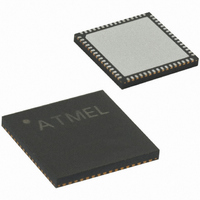ATXMEGA256A3B-MH Atmel, ATXMEGA256A3B-MH Datasheet - Page 51

ATXMEGA256A3B-MH
Manufacturer Part Number
ATXMEGA256A3B-MH
Description
MCU AVR 256KB FLASH A3B 64-QFN
Manufacturer
Atmel
Series
AVR® XMEGAr
Specifications of ATXMEGA256A3B-MH
Core Processor
AVR
Core Size
8/16-Bit
Speed
32MHz
Connectivity
I²C, SPI, UART/USART
Peripherals
Brown-out Detect/Reset, DMA, POR, PWM, WDT
Number Of I /o
49
Program Memory Size
256KB (128K x 16)
Program Memory Type
FLASH
Eeprom Size
4K x 8
Ram Size
16K x 8
Voltage - Supply (vcc/vdd)
1.6 V ~ 3.6 V
Data Converters
A/D 16x12b; D/A 2x12b
Oscillator Type
Internal
Operating Temperature
-40°C ~ 85°C
Package / Case
64-MLF®, 64-QFN
Processor Series
ATXMEGA256x
Core
AVR8
Data Bus Width
8 bit, 16 bit
Data Ram Size
16 KB
Interface Type
I2C, SPI, USART
Maximum Clock Frequency
32 MHz
Number Of Programmable I/os
49
Number Of Timers
7
Operating Supply Voltage
1.6 V to 3.6 V
Maximum Operating Temperature
+ 85 C
Mounting Style
SMD/SMT
3rd Party Development Tools
EWAVR, EWAVR-BL
Development Tools By Supplier
ATAVRDRAGON, ATAVRISP2, ATAVRONEKIT
Minimum Operating Temperature
- 40 C
On-chip Adc
12 bit, 8 Channel
On-chip Dac
12 bit, 2 Channel
For Use With
ATAVRONEKIT - KIT AVR/AVR32 DEBUGGER/PROGRMMRATSTK600 - DEV KIT FOR AVR/AVR32770-1007 - ISP 4PORT ATMEL AVR MCU SPI/JTAG770-1004 - ISP 4PORT FOR ATMEL AVR MCU SPI
Lead Free Status / RoHS Status
Lead free / RoHS Compliant
Other names
ATXMEGA256A3B-MU
ATXMEGA256A3B-MU
ATXMEGA256A3B-MU
Available stocks
Company
Part Number
Manufacturer
Quantity
Price
Part Number:
ATXMEGA256A3B-MH
Manufacturer:
ATMEL/爱特梅尔
Quantity:
20 000
- Current page: 51 of 445
- Download datasheet (6Mb)
5.5
5.6
5.7
5.8
8077H–AVR–12/09
Addressing
Priority Between Channels
Double Buffering
Transfer Buffers
By default, a trigger starts a block transfer operation. The transfer continues until one block is
transferred. When the block is transferred, the channel will wait for the next trigger to arrive
before it start transferring the next block. It is possible to select the trigger to start a burst transfer
instead of a block transfer. This is called a single shot transfer. A new trigger will then start a new
burst transfer. When repeat mode is enabled, the start of transfer of the next block does not
require a transfer trigger. It will start as soon as the previous block is done.
If the trigger source generates a transfer request during an ongoing transfer this will be kept
pending, and the transfer can start when the ongoing one is done. Only one pending transfer
can be kept, so if the trigger source generates more transfer requests when one is already pend-
ing, these will be lost.
The source and destination address for a DMA transfer can either be static, incremental or dec-
remental with individual selections for source and destination. When address increment or
decrement is used, the default behaviour is to update the address after each access. The origi-
nal source and destination address is stored by the DMA controller, so the source and
destination addresses can be individually configured to be reloaded at the following points:
If several channels request data transfer at the same time a priority scheme is available to deter-
mine which channel is allowed to transfer data. Application software can decide whether one or
more channels should have a fixed priority or if a round robin scheme should be used. A round
robin scheme means that the channel that last transferred data will have the lowest priority.
To allow for continuous transfer, two channels can be interlinked so that the second takes over
the transfer when the first is finished and vice versa. This is called double buffering. When a
transmission is completed for the first channel, the second channel is enabled. When a request
is detected on the second channel, the transfer starts and when this is completed the first chan-
nel is enabled again.
Each DMA channel has an internal transfer buffer that is used for 2, 4 and 8 byte burst transfers.
When a transfer is triggered, a DMA channel will wait until the transfer buffer contains two bytes
before the transfer starts. For 4 or 8 byte transfer, any remaining bytes is transferred as soon as
they are ready for a DMA channel. The buffer is used to reduce the time the DMA controller
occupy the bus. When the DMA controller or a DMA channel is disabled from software, any
remaining bytes in the buffer will be transferred before the DMA controller or DMA channel is
disabled. This ensures that the source and destination address registers are kept synchronized.
• End of each burst transfer
• End of each block transfer
• End of transaction
• Never reload
XMEGA A
51
Related parts for ATXMEGA256A3B-MH
Image
Part Number
Description
Manufacturer
Datasheet
Request
R

Part Number:
Description:
DEV KIT FOR AVR/AVR32
Manufacturer:
Atmel
Datasheet:

Part Number:
Description:
INTERVAL AND WIPE/WASH WIPER CONTROL IC WITH DELAY
Manufacturer:
ATMEL Corporation
Datasheet:

Part Number:
Description:
Low-Voltage Voice-Switched IC for Hands-Free Operation
Manufacturer:
ATMEL Corporation
Datasheet:

Part Number:
Description:
MONOLITHIC INTEGRATED FEATUREPHONE CIRCUIT
Manufacturer:
ATMEL Corporation
Datasheet:

Part Number:
Description:
AM-FM Receiver IC U4255BM-M
Manufacturer:
ATMEL Corporation
Datasheet:

Part Number:
Description:
Monolithic Integrated Feature Phone Circuit
Manufacturer:
ATMEL Corporation
Datasheet:

Part Number:
Description:
Multistandard Video-IF and Quasi Parallel Sound Processing
Manufacturer:
ATMEL Corporation
Datasheet:

Part Number:
Description:
High-performance EE PLD
Manufacturer:
ATMEL Corporation
Datasheet:

Part Number:
Description:
8-bit Flash Microcontroller
Manufacturer:
ATMEL Corporation
Datasheet:

Part Number:
Description:
2-Wire Serial EEPROM
Manufacturer:
ATMEL Corporation
Datasheet:











